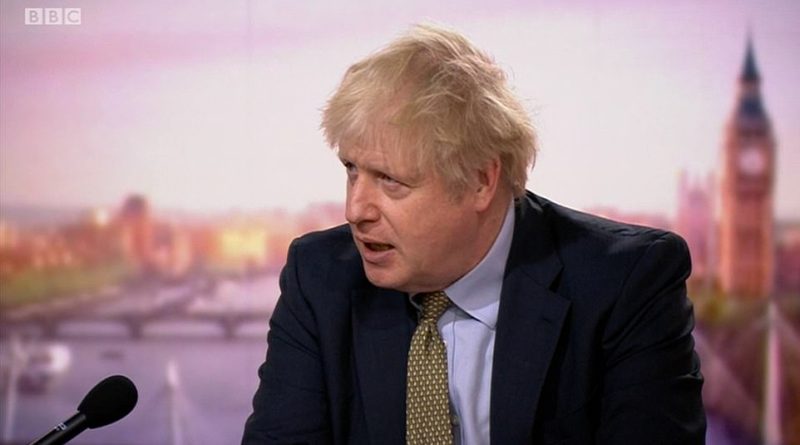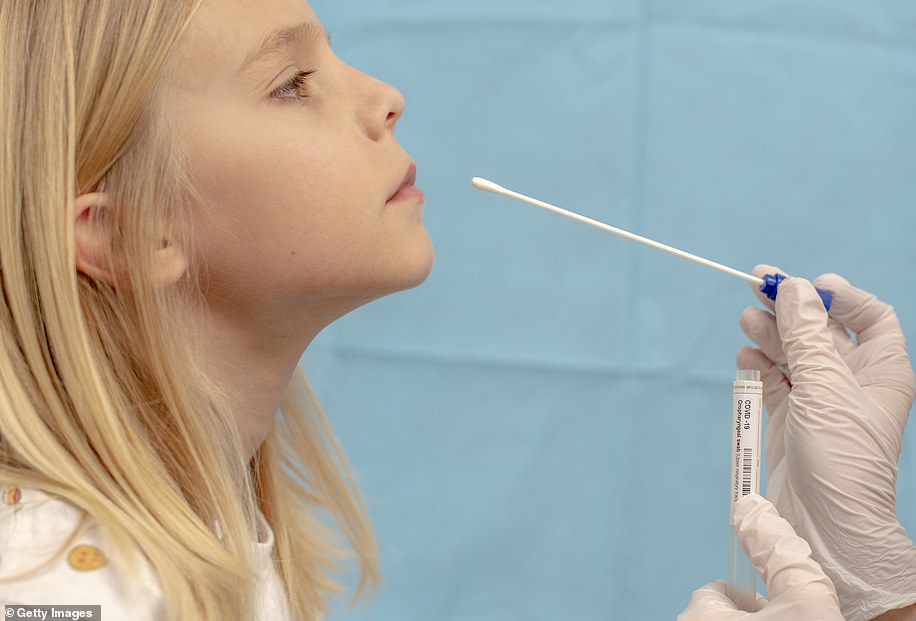PM will decide Monday whether to plunge ALL of England back into full lockdown
Boris Johnson will decide today whether to introduce stricter coronavirus restrictions as he faces calls from Labour to bring in a national lockdown.
The Prime Minister warned yesterday that curbs were ‘probably about to get tougher’ as Government sources said more areas of England could be plunged into Tier Four in days.
Under the strict measures, already in place across three-quarters of the country, only essential shops such as supermarkets are allowed to open and people are meant to stay at home.
Mr Johnson said he was also considering further closures of schools.
Cabinet sources said they expected the Government’s ‘Covid-O’ committee, which makes decisions on lockdown restrictions, would meet today to decide on the next steps to take.
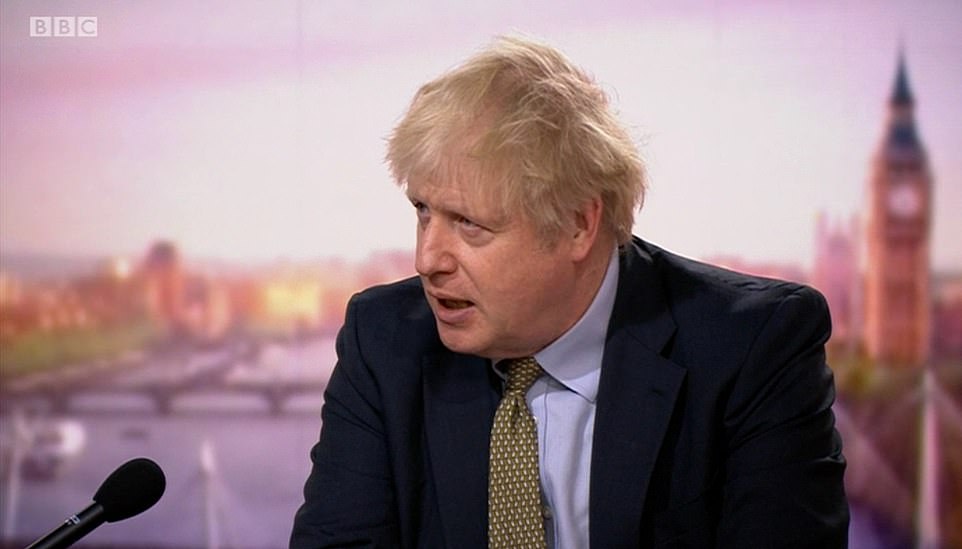
The Prime Minister has warned that curbs were ‘probably about to get tougher’ as Government sources said more areas of England could be plunged into Tier Four in days
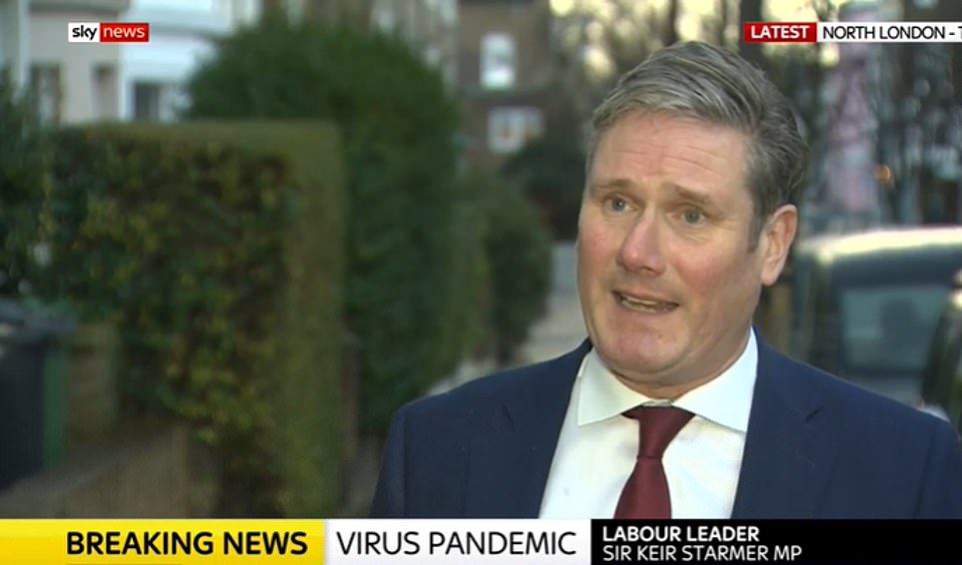
Sir Keir Starmer demanded an immediate nationwide lockdown as he warned the ‘virus is clearly out of control’. The Labour leader added: ‘Let’s not have the Prime Minister saying, ‘I’m going to do it, but not yet’

This map shows how the coronavirus variants have been tracked as they spread around the world
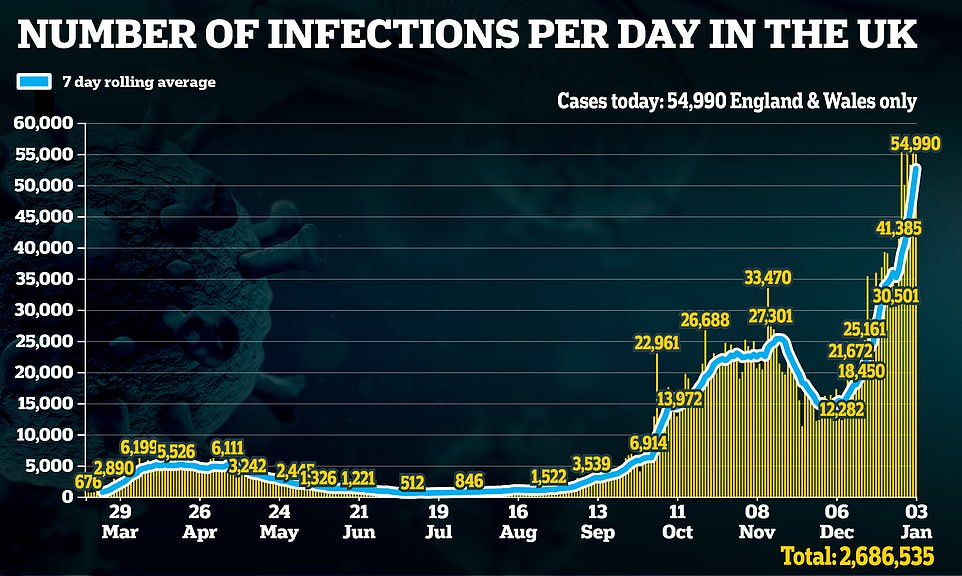
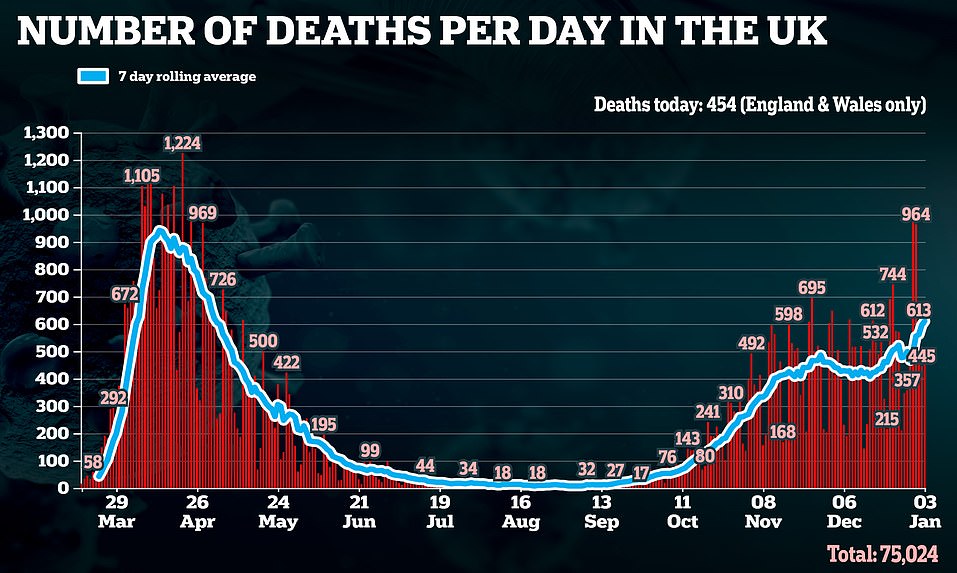
Official figures show there had been a further 54,990 lab-confirmed cases of coronavirus in the UK, up 80 per cent from last week’s case figure of 30,501, while the number of deaths had increased by 43 per cent from last Sunday to 454
Last night, Sir Keir Starmer demanded an immediate nationwide lockdown as he warned the ‘virus is clearly out of control’. The Labour leader added: ‘Let’s not have the Prime Minister saying, ‘I’m going to do it, but not yet’.
‘That’s the problem he has made so many times. Nationwide lockdown – the Prime Minister has hinted that that’s going to happen, but he’s delaying again; and we can’t afford that again.’
Appearing on The Andrew Marr Show on BBC One yesterday, Mr Johnson said he was ‘entirely reconciled to doing what it takes to get the virus down’ and warned of a ‘tough period ahead’.
He said vaccinating more people would provide a way out of restrictions and that he hoped ‘tens of millions’ would be vaccinated in the next three months.
The Prime Minister stuck by his prediction that the situation would be better by the spring, but added: ‘It may be that we need to do things in the next few weeks that will be tougher in many parts of the country. I’m fully, fully reconciled to that – and I bet the people of this country are reconciled to that because until the vaccine really comes on stream in a massive way, we’re fighting this virus with the same set of tools.’
Mr Johnson said the Government was assessing whether Tier Four restrictions were tough enough to control the spread of the virus or if
further steps were needed, adding: ‘We’ve got to keep things under constant review.’
Asked whether people could be restricted to an hour’s exercise a day or a complete ban on any households mixing could be introduced, he replied: ‘There are obviously a range of tougher measures that we would have to consider. I’m not going to speculate now about what they would be.
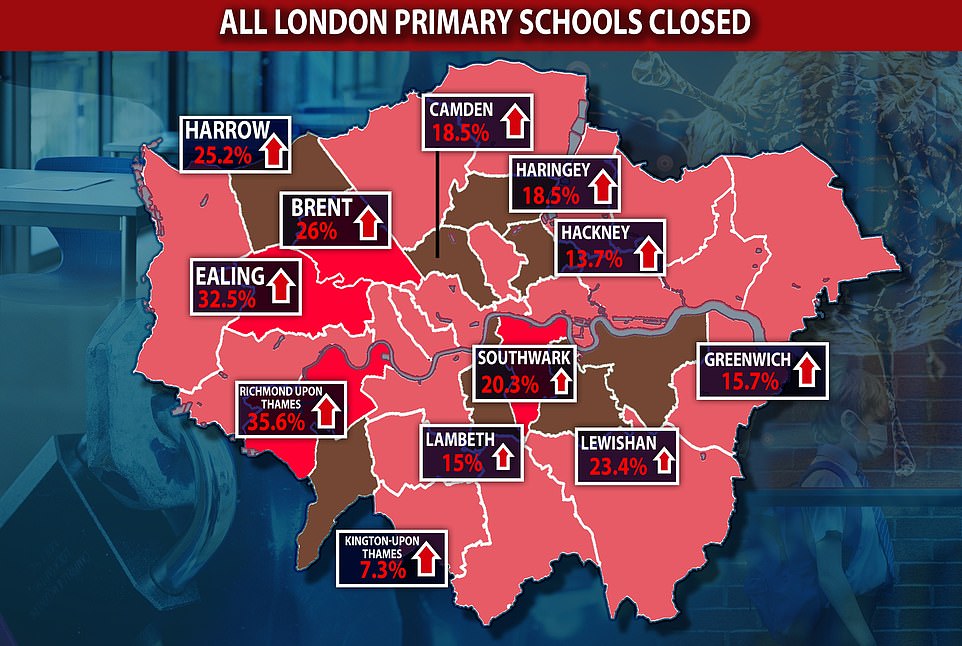
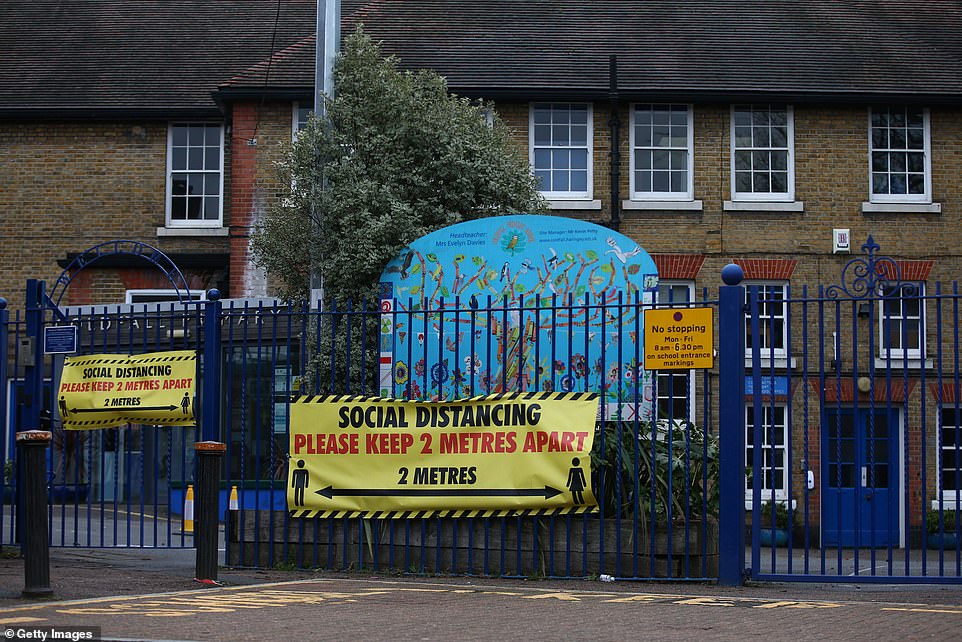
Social distancing signs displayed at Coldfall Primary School in Muswell Hill, London, on January 2 as Covid cases across the capital city have been putting rising pressure on the NHS
‘Clearly, school closures – which we had to do in March – is one of those things. It’s not something we necessarily want to do.’
A Government source said last night that ministers were looking at putting even more areas of England into Tier Four.
Professor Sir Mark Walport, a member of the Government’s Scientific Advisory Group for Emergencies (Sage), said it would be difficult to keep the new, faster-spreading strain of the virus under control without ‘much tighter’ social-distancing measures.
Speaking on The Andrew Marr Show, the former chief scientific adviser said: ‘It’s clear that this variant is transmitting more readily – it’s transmitting more readily in younger age groups as well.
‘It’s important to note that it doesn’t appear to cause worse disease or that it’s going to be more resistant to the effects of the vaccine, but it is going to be very, very difficult to keep it under control without much tighter social-distancing measures.’
Sir Keir insisted there could be ‘no more dither, no more delay’, adding: ‘The longer you delay the difficult decisions, the worse it is on the health front, the worse it is on the economic front.’
Responding to his remarks, a No10 source said: ‘The Prime Minister has been consistently clear that we are driven by the need to protect the NHS and save lives – unlike Labour, who have spent ten months playing party politics.
‘We have moved more areas into Tier Four to bear down on the new variant and escalated other areas into Tier Three. This targeted approach is the right one.’
Surge in ward cases ‘could fill 12 hospitals’
By Glen Keogh and Colin Fernandez for the Daily Mail
The number of beds occupied by Covid patients increased by the equivalent of ’12 full hospitals’ in the eight days from Christmas, NHS figures show.
Between December 25 and January 2, the total number of inpatients suffering with coronavirus in England jumped from 17,701 to 23,557 – up 33 per cent.
Chris Hopson, chief executive of NHS Providers, described the increase as the equivalent of ’12 extra full hospitals, full of Covid patients’. The East of England, London and the South East recorded the largest percentage increases in hospital admissions for those suffering with the virus as the new, more infectious strain continues to take hold.
Mr Hopson said: ‘You can imagine why people in the NHS are worried about how quickly this virus is spreading.’
Meanwhile, emergency plans are being drawn up to move critically-ill patients hundreds of miles as part of a ‘pairing’ scheme designed to ease pressure on regions where the NHS is struggling to cope.
Those in the East of England could be moved to hospitals in the Midlands while health trusts in the South East are preparing to send patients to the South West.
It is believed to be the first scheme of its kind in NHS history. Mr Hopson said it would involve only a small number of patients being moved from London when space in neighbouring hospitals was exhausted.
‘If it gets more difficult, we will find other ways to trea
t people within the region but we know there are some patients that can be moved to where the pressure is slightly less, for example the South West and Midlands,’ he told the Sunday Times.
On New Year’s Eve, three intensive care units in London were reportedly full, with seriously-ill patients awaiting transfers to units elsewhere. North Middlesex University Hospital, Barnet Hospital and Whittington Hospital, in the north and north-west of the capital, described various issues including patients receiving oxygen in A&E, in an email leaked to Sky News.
Dr Alison Pittard, the dean of the Faculty of Intensive Care Medicine, said the NHS is trying to continue with its other services and treat patients while also dealing with the second coronavirus wave.
She told the BBC’s Andrew Marr Show: ‘One of the things I would like to tell the public is that if you have any concerns, whether it is about Covid or not, you must seek advice and help.’ She said there are ‘logistical issues’ with the temporary Nightingale hospitals, some of which have been used to support diagnostic services.
Yesterday NHS bosses denied reports that cancer operations would need to be delayed to ensure there were enough beds in London.
‘Don’t let this be you’ Covid patient, 49, tells how she watched her mother, 76, die in hospital as they BOTH battled virus in intensive care after disease ‘ravaged’ her family
- Anabel Sharma, 49, taken to hospital with Covid along with mother Maria, 76
- Pair took a photo together in hospital beds as they received breathing support
- Maria died 24 hours after the picture was taken at Leicester Royal Infirmary
- Anabel, a mother-of-three, has now warned others about dangers of Covid-19
By James Robinson for MailOnline
A woman who lay side-by-side in intensive care with her mother as she died from Covid has warned others ‘don’t let this be you’.
Anabel Sharma, 49, and her mother Maria Rico, 76, lay next to each other in hospital as they both battled Covid-19 after the virus ‘ravaged’ her family.
The pair were pictured for a final time as they held hands while both receiving support for their breathing. Less than 24 hours later, Maria had died.
Now, in a stark warning about the dangers of the virus, mother-of-three Anabel, from Leicestershire, has urged others they could lose family members if they do not stick to the rules.
Speaking to the Mirror: ‘I never thought Covid would hit us – but it did. The speed Covid ravaged through our family was frightening.
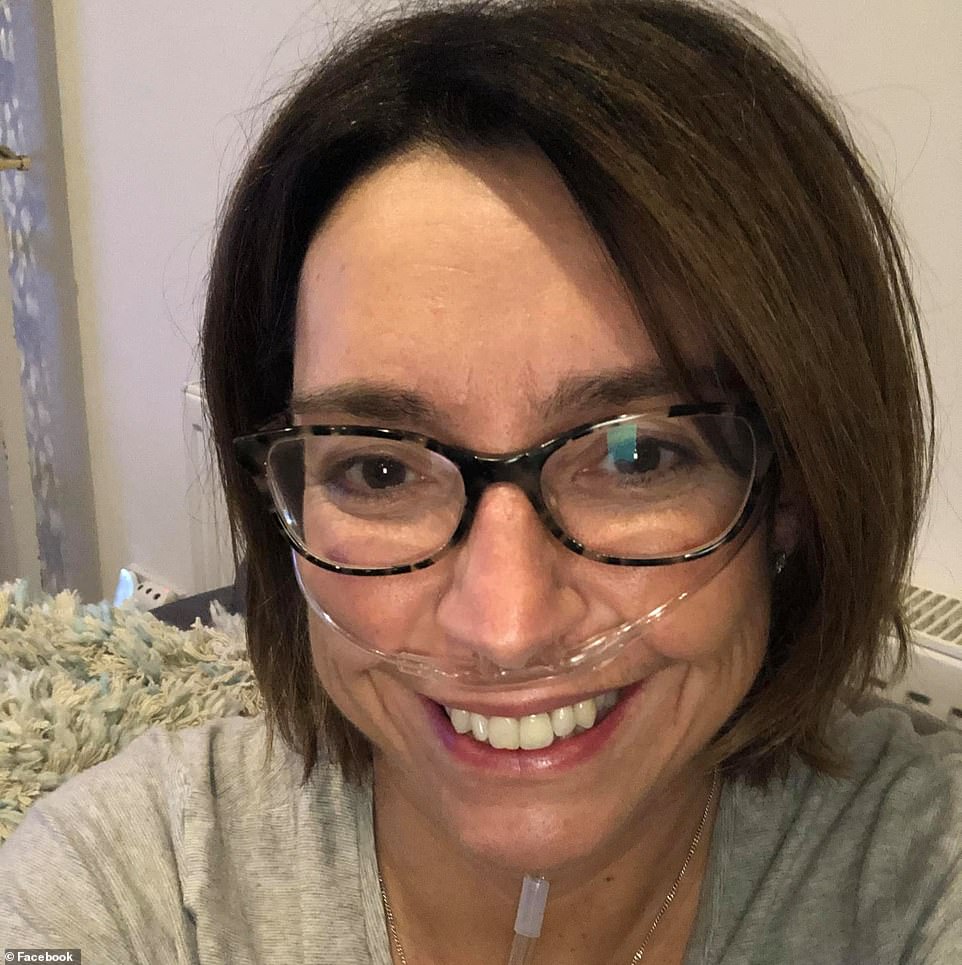
Anabel, 49, and her family, all fell ill from Covid towards the end of last year

‘If anyone is thinking about breaking the rules, I’d urge them to put themselves in my shoes and think about what it might be like to watch your mum die, or be told that you might not live.’
Anabel, 49, and her family, all fell ill from Covid towards the end of last year.
Her 12-year-old son first Isaac contracted Covid following the return to school in September, according to the Mirror.
Anabel, her husband Bharat, 47, and her other sons Jacob, 22, and Noah, 10, later contracted the virus, the paper adds.
Her mother Maria was the last to test positive for Covid.
Bother Anabel and Maria taken to Leicester Royal Infirmary in mid-October and put onto oxygen beds away from each other.
But after Maria signed a Do Not Attempt Resuscitation (DNAR) order, Maria was wheeled in a bed next to Anabel.
Maria died on November 1 – 24 hours after the pair had taken a picture together showing her on a breathing machine and Anabel in an oxygen mask.
Anabel said she took off the oxygen mask in order to say goodbye to her mother.
In an emotional post on Facebook page ‘Humans of Covid-19’, Anabel said the ordeal had been the ‘darkest period of my life’.
She said: ‘By the time my mum and I were rushed to A&E, we both needed ITU but they were full.
‘We only got our beds because four patients died that day, freeing up spaces.’
She described the type of treatment she received for Covid – Continuous positive airway pressure (CPAP) – as ‘horrific and relentless’.
‘I had to wear a plastic hood 24/7 for four weeks that forced oxygen into my lungs.
‘It felt like sticking your head out of a car going at 30mph, it was noisy, I couldn’t see, hear, and they fed me though an opening on the side of the hood,’ she added.
Anabel also revealed she was unable to attend her mother’s funeral due to Covid, adding: ‘I watched it via live stream. I was alone, as were my family, we couldn’t comfort each other, it broke my already fragile heart.’
In a warning to others about Covid, she said: ‘What you read about NHS bed pressures is true, it isn’t like the flu and people are dying or if they are a survivor like me, they may never be the same again.’

